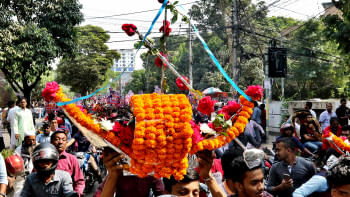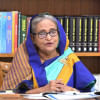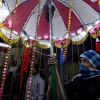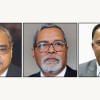The Great Game will continue

The pressing questions after the January 7 election are how the result and the electoral process will be considered by the international community and what impact it will have, if any, on the relationship with Bangladesh's external partners, especially the West. These questions have become important because of the series of events leading up to polling day and the low voter turnout.
The series of events since October 28 sent out the message that the ruling party had planned the election to ensure a victory. The absence of democratic behaviour is no longer hidden under the carpet. The persecution of leaders and activists of the opposition parties, especially the BNP, drew international attention and criticism. It was matched with other kinds of intrigue and machinations, such as fielding "dummy" candidates and using state apparatuses to ensure victory of the preferred candidates.
It was highlighted before the polling day that the goal of the incumbent Awami League was to draw a large number of voters to the polling stations. The party hoped that its supporters and supporters of the "independent" candidates would make up more than 50 percent of the voters. But January 7 showed how voters shied away from the polling booths. Then came events casting serious doubts about the turnout data. The Election Commission (EC) said around midday that the turnout was 18.5 percent, and around 3pm it was around 26 percent. But an hour later, as the polls closed, the official estimate was claimed to be 40 percent. That, too, was announced in a bizarre way. Chief Election Commissioner (CEC) Kazi Habibul Awal, in a press briefing, said the turnout was about 28 percent, only to retract at the prodding of his colleagues and offered a new, higher number. However these numbers are presented in the future, their veracity will continue to dog the EC. Considering that the election was essentially uncontested, there was never any doubt about the victory of Sheikh Hasina and the AL, but the entire process has added further questions to her victory and the strength of her mandate.
As for the reactions of the international community, there was the predictable part—those who had already supported the incumbent have already sent congratulatory messages. These are India, China and Russia, along with a few other nations. The "unknown unknown" part of the equation was the reactions of Western nations. These countries insisted on a free, fair and inclusive election, but have remained remarkably silent since October 28. The US reaction, expectedly, stated that the January 7 election was not free or fair. In a similar fashion, the UK said that the standards of credible and fair competitions were not consistently met during the 12th parliamentary election. The West will continue to consider not only the stray incidents of ballot stuffing and violence on January 7, but also how the entire process unfolded contrary to its efforts.
The US faces a dilemma: whether to reassess its relationship with Bangladesh and act robustly, or sidestep for a foreseeable picture. A robust action will demonstrate that it is returning to its divergence with India. Will Western countries go about a business-as-usual engagement with the "new" government? Notwithstanding the political aspect of it—an abandonment of its policy of democracy and human rights promotion—there is an institutional aspect to it too. For a long time, there have been security-related cooperation between the two countries, but leading to the election, evidently some of these institutions' integrity have been eroded as these have been blatantly used as political tools. If the US and the West adopt direct or indirect measures, there will be serious adverse impacts on Bangladesh's economy.
The predictable reactions of the trio—India, China and Russia—do not mean that the relationship between Bangladesh and these countries will continue as before. A contest between these nations, especially between China and India, will intensify to expand their sphere of influence. That will not be a matter of the distant future, but within a short period of time. Due to the ongoing economic crisis, Bangladesh will need to rely more on external support. This will bring Bangladesh and China closer, but how much closeness is acceptable for India is the question for the coming days. As such, whether the Western countries "act" or not, the country will continue to be the theatre of the Great Game.
Ali Riaz is distinguished professor of political science at Illinois State University in the US.
Views expressed in this article are the author's own.
Follow The Daily Star Opinion on Facebook for the latest opinions, commentaries and analyses by experts and professionals. To contribute your article or letter to The Daily Star Opinion, see our guidelines for submission.

 For all latest news, follow The Daily Star's Google News channel.
For all latest news, follow The Daily Star's Google News channel. 










Comments